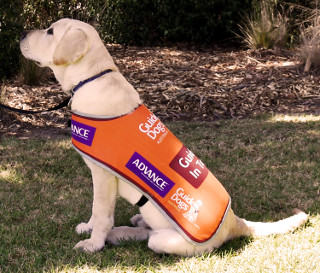Guide dogs, seeing eye dogs and assistance dogs

Guide dogs
Guide dogs (and seeing eye dogs) are legally able to go to any event, business or premises in Victoria (except operating theatres).
This includes travelling on:
- planes
- any form of public transport (taxis, buses, trams and trains).
It includes entering:
- theatres
- restaurants
- supermarkets
- hotels
- retail stores.
These access rights apply to:
- guide dogs
- guide dogs in training
- guide dog puppies.
The rights of guide dog users are covered under the Domestic Animals Act 1994 and the Disability Discrimination Act 1992 — both of which override the Health Act, which prohibits dogs from entering food premises.
Guide dog puppies
Puppies as young as 7 weeks old can be guide dogs in training.
To prepare puppies for future guide dog training, carers must take them:
- on public transport
- to shops
- to cafes
- to restaurants.
Guide dog puppies have been specifically bred for their important role as guide dogs. When training in public they will be wearing blue or yellow identification jackets.
At all times guide dogs are:
- quiet
- well-behaved
- not aggressive
- completely clean.
When travelling, guide dogs are trained to sit quietly at their handler's feet and will not disturb or lick the driver.
Taxis, uber and other shared ride services
It is illegal for taxi, uber and other shared ride drivers to pass up a passenger because they have a guide dog or puppy. If this happens to you, contact the Taxi Services Commission on 1800 638 802 or lodge a formal complaint online. Your complaint can be taken over the phone or in person if you have difficulty completing a form.
Help resolving issues
Contact Guide Dogs Victoria on 1800 804 805 for assistance if you are a guide dog user and unable to resolve an issue with the proprietor after being denied access to:
- a public area
- business premises.
Assistance dogs
The Equal Opportunity Act 2010 (the Act) protects people with disabilities from discrimination. This includes protection from discrimination because a person has an assistance dog.
An 'assistance dog' is any dog that is trained to perform tasks or functions that help a person with a disability to alleviate the effects of the disability. This includes dogs trained to:
- pick things up for people with mobility disabilities
- assist people who have seizures.
Assistance dogs can play a significant role increasing the independence of people with a range of disabilities.
Employers, goods and service providers and others, must not discriminate against someone because they have an assistance dog. This means that a person with an assistance dog must generally be allowed:
- onto transport
- into cafes
- into restaurants.
The Act specifically says that it is unlawful to refuse to provide accommodation to a person with a disability because they have an assistance dog. You also can't charge the person extra or ask them to keep the assistance dog somewhere else.
The Act doesn't apply this protection to other types of companion animals.